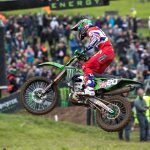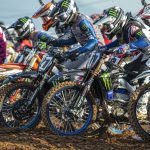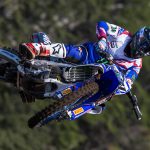A few amazing things about Jeffrey Herlings: he is still only 23 (now almost a decade as a Grand Prix rider and it feels like he has been terrorising record books for an age). He’ll reach eleven years with Red Bull KTM before his next contract is up. He is a sensational athlete and vision in the sand. He has reached a phenomenal 71 GP wins (a little under an average of 8 a season) all with one brand and team. And…he hasn’t quite learned to drink-in the elation of his feats.
“Hmm, not much,” the Dutchman admits. “Even in the last few races that I’ve won the feeling goes very quickly after crossing the line because the job was done…so the mind switches immediately to the next race and thoughts of: What could be better or improved? Was it something of my performance? My fitness? My starts? Race strategy? I always want to get the best out of myself. On the other side you do feel like giving yourself a bonus now and again. You feel like saying “I won today…I’ll eat some French fries!” but then I’ll stop myself because I know that in five days I’ll have to prove myself again, so no presents. It’s tough. That’s why I have a lot of respect for certain guys, like Tony [Cairoli] who is 32 and has done it at this level for so long. It’s pretty special.”
Like all geniuses Herlings is a ball of conflict. The former ‘wild child’ that likes to total stats, cash and hefty winning margins is tempered by a more mature individual that has learned more restraint, respect and greater awareness of how he is perceived. A rider that would scrape the physics and physical limits of what is possible on a dirtbike is now one that admits to settling for lower podium places. A former feeling of ‘immortality’ is firmly checked by scars on his femur and tenderness around the hip. A person that both wants and likes to show off their supremacy but also seek quiet corners and the company of the few people he really trusts and – for a 23 year old – he barely exists in the social media landscape (“I know it is important to share things with the world…but I still want to keep things private. Some riders share almost everything and I share basically nothing!”).
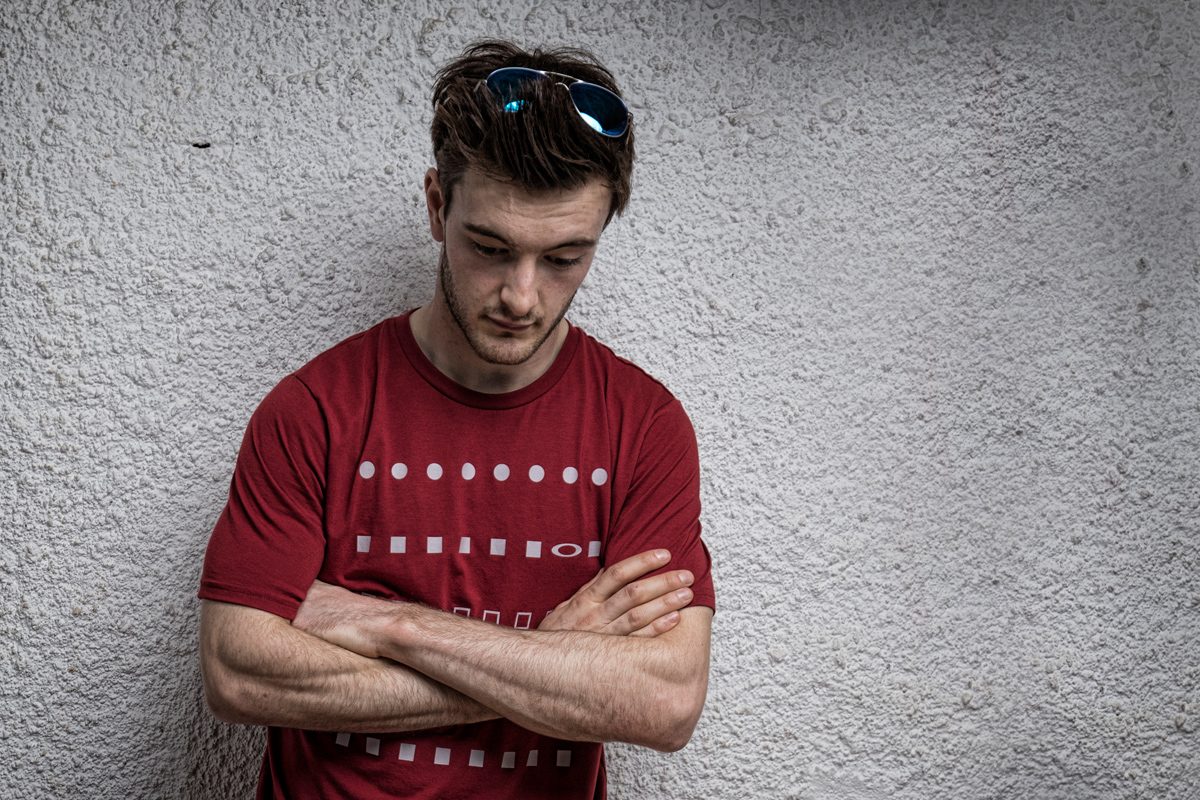
Jeffrey is a rare sportsman and human being. A world-class performer and achiever before many are legally allowed to vote, his ascension to the top of Grand Prix was rocket-fuelled and the space to grow and mature was extremely limited. “He’s come a long way,” muses Team Manager Dirk Gruebel, who has been overseeing Herlings’ racing since 2011. “In the past you would be happy when he finally got on the bike because it was the least stressful part of the day: he was a handful! He changed a lot in that way and it comes from growing up and getting older. Finding his way as a person and in society.”
For all his fame Herlings often cuts a lonely figure. He is open and friendly and will talk to any rider in the gate and has his buddies in the paddock. He doesn’t use a motorhome and exists between the race truck and the Red Bull Energy Station. He usually arrives late on a Friday for a grand prix and will normally be booked on the earliest flight possible on a Sunday evening. Three world titles and victory in eight of the nine home Grands Prix at Valkenswaard that he has contested means that he has experienced a degree of craziness and intense demand around him. He will gain national press coverage in Holland but otherwise is a mysterious minor celebrity; a guy with the same few pals and the same rank of sponsors almost since the beginning in 2010. “He has his private side and if he doesn’t want to be found then you won’t see him,” asserts Gruebel.
Naturally Jeffrey has been the subject of various feature interviews and covers in OTOR. He is a good talker (and typically loud for a Dutchman) but has become even more guarded with his opinions and comments over the last few seasons. His profile reached a new level of the stratosphere in the summer when he squeezed a wild-card appearance at the last US AMA Pro National at Iron Man in Indiana and slotted the victory among the five wins from the last six rounds of MXGP. A week after the American success and at the USGP in Florida, the clamour for his time was easily on a level with the top MotoGP riders. It was a baffling period for #84 and undoubtedly opened his eyes to the extent of his international appeal.
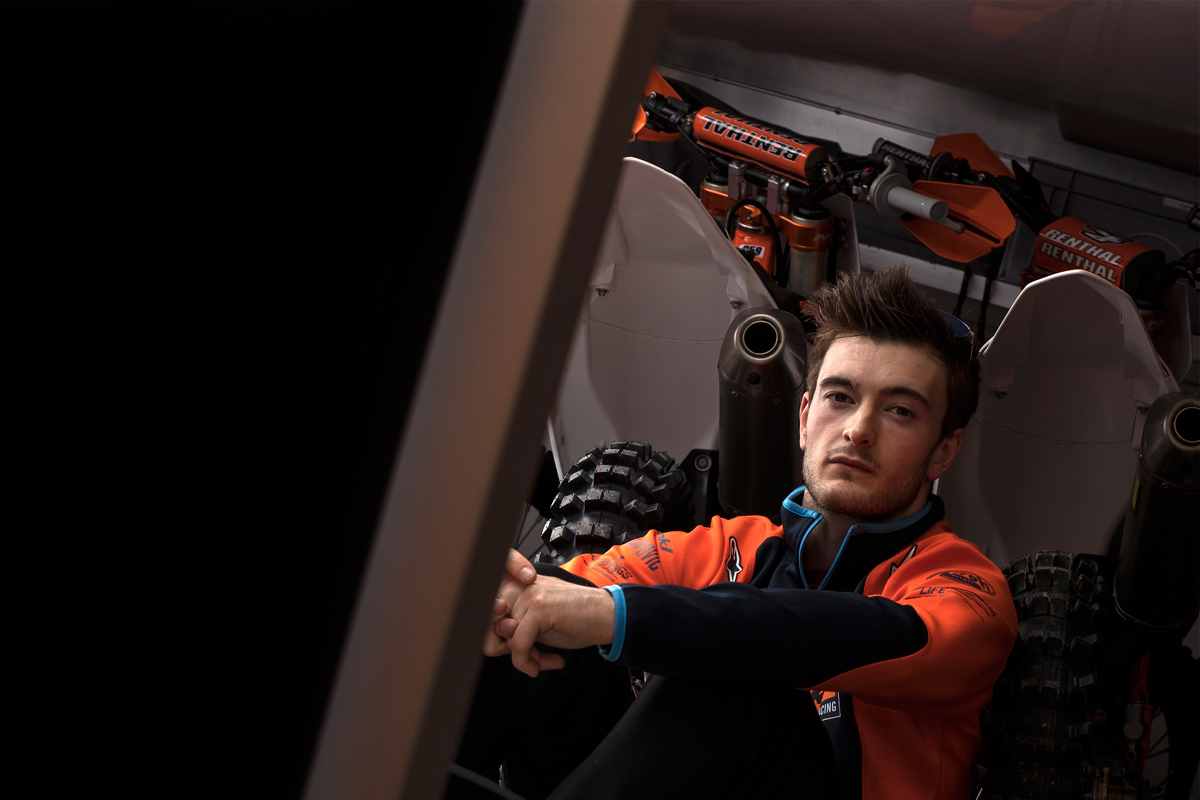
This time we are catching up over lunch. We feel guilty for interrupting a very simple plate of chicken and rice on Friday at the Grand Prix of Comunitat Valenciana at Redsand but Herlings insists it is fine to chat. We’ve gained some perspective from those around him like Gruebel and practice mechanic/close friend/confidant Ruben Tureluren to intersperse some of his comments and feelings and in an effort to gain the latest 360 picture of Jeffrey as he bids to become just the third MX2 and MXGP Champion since the categories were inaugurated in 2004.
Now established as an MXGP standings leader and race winner (he has only missed two podiums since round six of the 2017 campaign) the Herlings’ tale continues with vigour. Just how and why is he so damn good?
“For me he is very talented on a motorcycle, he has inherited a big ‘engine’ genetically from his parents and he trains really hard, so he doubles up on that part,” offers Tureluren. “He is mentally strong and knows his abilities and works so hard. Don’t forget that he has a very strong commitment and desire to win. I’ve never see anyone else like that.”
“I would say yes, he is one of the best I have seen,” opines Gruebel. “In terms of determination and the way he approaches his job…we’ve had many good riders at Red Bull KTM but some of them you had to push to fill their programme and race on the level they are able…to but not with Jeffrey; he wants it more than anybody else.”
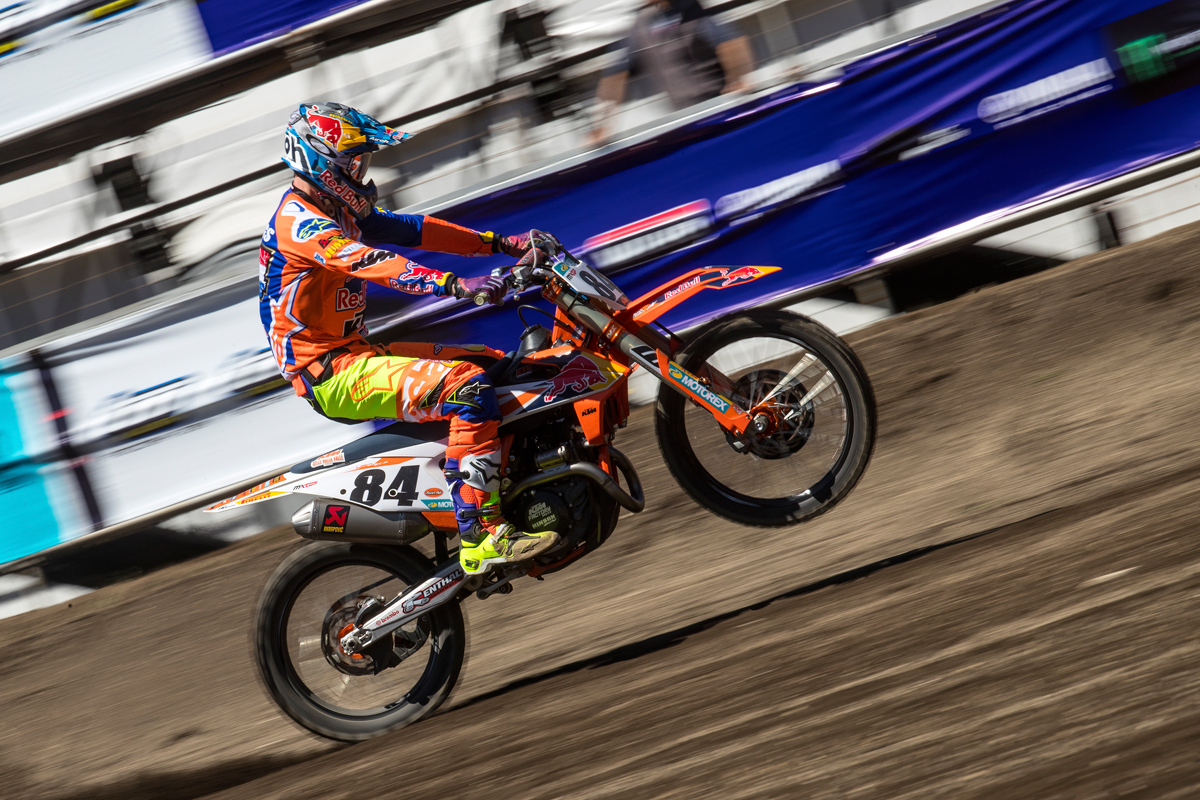
‘Wanting it’ means serious saddle time and therefore a heavy commitment from his team and people like Ruben. “It is very demanding and time-consuming,” the Belgian says. “Not only in the fact that he rides a lot but everything else: the tyres wear out faster, the frame and engine accumulates more hours…even though he is not hard on the bike.”
“We put a lot in…but we get a lot out of it because he pays us back with the results and that’s all that counts in the end,” equates Gruebel. “It doesn’t help if I have a grumpy Jeffrey at the weekend because I only let him ride twice that week and he wanted to go three times.”
“He always told me that he took a ‘click’ from being beaten by [Max] Anstie when they were on 85s,” reveals Tureluren. “It made him realise from one day to the next that to be successful he had to step things up and work harder or ride more than the rest. It was a chain reaction and whatever he did seemed to work and pay off. It is then easier to hold onto that and do even more. If you look at it another way then if you do a lot of work and you don’t see the benefit then it is difficult to keep going like that week-in, week-out. With Jeffrey he puts in the work and always gets the results somehow!”
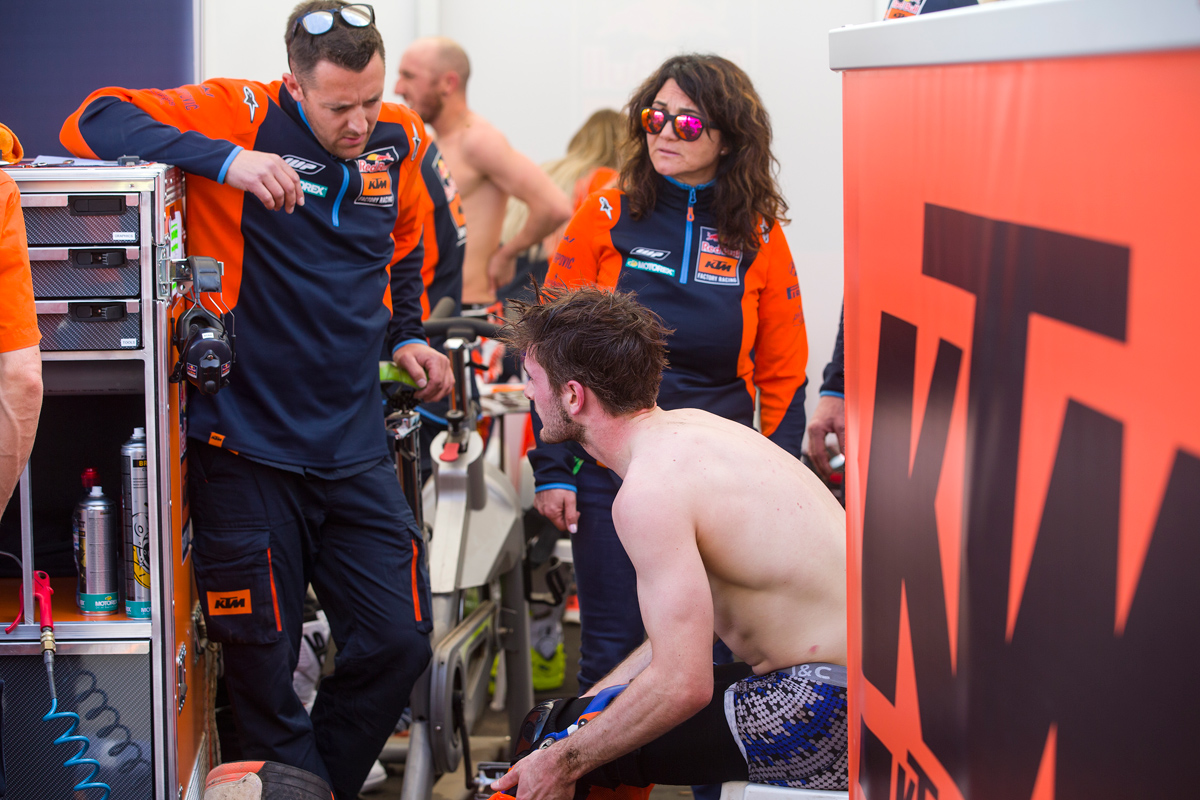
Gruebel gets even more analytical: “He is not the most technical rider but he is very talented and he has such a big heart. He never gives up. He puts so much effort in, perhaps more than anybody else in terms of riding hours during the week. I don’t know if it is necessary to ride that much…but that is just him and he is constantly improving. He is never satisfied and if there is something to be improved then we go riding again and we test. He has a good eye for lines and is not scared to go for something.”
Jeff, what does it feel like to be the fastest motocrosser in the world?
Good…because thinking like that can give you a lot of confidence….but also not that good sometimes because it brings a lot of pressure. You feel like you have to prove it day-in-day-out year-in-year-out and sometimes you don’t feel it. It’s tough because there are some days where I’m tired or carrying a small injury. I feel that I don’t need to win every race…as long as I can try and win the ones where I am feeling good then that’s OK for me. The GPs where I’m not riding great then if I can do my best then fine. If that means a fifth place then that’s what it will be.
How do you keep happy away from the bike?
The results speak.
That’s not answering the question!
Yeah but when the results are there then the sacrifice doesn’t matter so much. If you are out front then you are happy in your daily life and everything. Last year when I was struggling at the beginning of the season with injuries I was not happy and it was tough in my private life. My friends accused me of being grumpy. I was not doing good ‘at work’ and felt it everywhere.
In the past you seemed to be about ‘more’ than the result. It was about winning with authority…
It’s so true when they say you’re only as good as your last race. If I blow the next one then they won’t talk about Valkenswaard, Argentina or Trentino. Things come and go quickly but I feel like I have been on a high since I went to the U.S. last year. I won the last three races and did good at the Nations. I’m here to deliver the best results I can.
MX2 came so easy for you. You must have had more question marks over the 450s though…?
For sure, especially because I knew I’d be facing one guy who is just like me: he wants to win badly and is physically good with the same team behind him. I’m racing someone very strong and that makes it hard because in MX2 – and I don’t mean this in a bad way – but I was not facing the level of rider that I am now.
Is it annoying that people talk about you and Tony all the time or is it cool for the sport to hype it up?
I think it’s actually a cool thing and it is good in a few different ways; for me, for Tony, for KTM, Red Bull. For a manufacturer it is like a dream come true. For both of us we want to be the best one on the brand. I would not say I’m at the beginning of my career but I am new to the 450 stage whereas Tony is coming to the end – I’m not saying he’ll retire in two years but it’s not like he has another ten to go. Overall I think it’s cool.
After winning you mentioned thinking directly about the next race. Did those big injuries with the hip and femur not teach you to enjoy life away from racing a bit more?
No, because you almost forget them. When you are injured it swings the other way. You think ‘I want to retire from this sport’ and ‘I’m over it…’ but when you start racing again and a bit of success comes then it feels like your only option. It is a mixed way to live and I definitely remember the days of lying in bed with a broken leg for a few weeks and also with a hip for weeks unable to move…but they are times that come and go and you just try to forget about them.
It’s a funny way to live…
Yeah, but I did learn a lot from that time. When I go into a battle now I will do it 100%, but I won’t go over that mark. I won’t take the extra risk. Being in a hospital bed is not worth it for me any more. It’s easy to say that because it is a dangerous sport and we must not forget what can happen. So it is a mix…but we try to look to the positives. I think I also developed as a rider because I can accept to lose. I can accept third place and be OK with it. A few years back I would go crazy and crash my brains out. I think I improved in that respect.
Looking back do you think it is almost a bit of a shame that you had to grow up in the public eye? There are not many fifteen year olds succeeding in a world championship and having all the acclaim and pressure you had to deal with…
Click HERE to go straight to the rest of the article in this month’s OTOR magazine
Photos by Ray Archer

